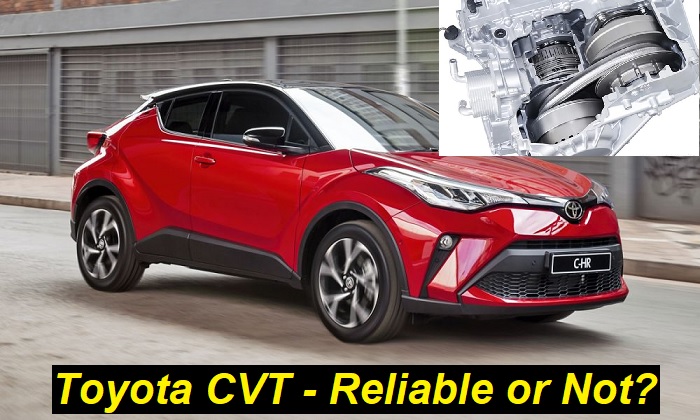Many years ago, all automatic transmissions were based on a so-called torque converter and it was a very reliable and long-lasting unit. Today, the old conventional automatic transmission is not fuel-efficient and there are some alternatives, such as dual-clutch transmissions and continuously variable transmissions (CVT).
Toyota CVT transmissions highlights
- Average lifespan:130,000-150,000 miles
- Reliability Score:Medium
- Prone to minor issues:No
- Price for repair after failure:Usually, no repair
- Price for replacement:$4,000-$6,000
- Availability of parts:Poor
- Common problems:overheating, control module problems, clunking, only reverse available, slipping, car doesn't move

Any special technologies for the Toyota CVT?
First of all, we should say why Toyota turned from conventional automatic transmissions to CVTs. The actual reason is that the CVT provides the car owner with a smooth drive and offers better gas mileage than the conventional automatic transmission with the same engine. Also, these transmissions are thought to be more eco-friendly as they help reduce emissions.
The driving experience can also be better with the CVT transmission thanks to the fact that it doesn't really shift gears. Steady acceleration feels much better than shifts, especially in city driving.
Speaking about the special technologies of Toyota, we can say the following:
- these transmissions are pretty simple in design (if you don't take the eCVT that comes with hybrid engines and is a totally new world of technologies);
- they have nearly all the problems that all other CVTs have (like Nissan or Honda CVT units);
- they have more complicated technologies in terms of control units and programming than CVTs of other manufacturers;
- all significant parts in the transmissions made by Toyota are more reliable, but it doesn't guarantee better mileage;
- these transmissions are usually used in smaller cars while in big SUVs and pickup trucks, Toyota still uses conventional automatic transmissions;
- the CVTs by Toyota are practical, but repairing them may be a hard task for a person with little experience.
So, the construction is pretty much the same as the Nissan CVT or any other CVT in the world. But Toyota makes all its units more reliable thanks to the quality of materials and also the quality of assembly. Just because of that, the majority of Toyota CVTs are more durable than many counterparts.
I love the way these transmissions allow you to drive. They are smooth, they spare some fuel for you, and they aren't prone to minor damages and problems. But the question is if they are reliable enough to work for the whole lifetime of a vehicle. And here I have some bad news you will not want to know if you have a Toyota equipped with a CVT transmission.
How many miles can a Toyota CVT go?
Unfortunately, this is not a simple question to answer. I can say that an average CVT in a Toyota vehicle will last about 120,000 - 140,000 miles. After that, you have two options: repair the old transmission and get more problems in 40,000 miles or even earlier, or replace the transmission with a new one.
The mileage can still be greater. I've seen numerous Toyotas with original CVT transmissions that successfully passed the 200,000-mile mark. But this is rather an exception. I've also seen Toyota owners who told me that the first repair of their CVT was needed at 35,000 miles. Thank goodness, a warranty usually covers such problems.
The mileage of a CVT transmission depends on many factors. For example, the way you drive your car, the conditions of driving, the maintenance schedule, the type of oil you use, and also the luck are very important factors. Later, I am going to give you some tips that will help you drive the Toyota car equipped with the CVT much longer and have no problems.
What are the common issues with a Toyota CVT transmission?
The number of common problems here is enough to write a full article, but I'll try to be short in this section. Unfortunately, different generations of the CVT transmissions made by Toyota have different types of problems. They may appear in different mileage and after different conditions. But the best thing is to know about all of them if you own a car with a CVT.
Here are some common issues that are often described in the reviews:
1) Overheating
If you want aggressive and very active driving, you better avoid vehicles with CVT transmissions. These units are good for family cars that are mostly driven in the city and don't complete any hard tasks.
2) Control module failure
Unfortunately, Toyota doesn't provide its clients with very reliable electronics. At 100,000 miles the TCM may need replacement. And this doesn't make much sense because it's expensive and soon the transmission is going to need replacement.
3) Clunking sounds from a CVT
Sometimes, it's just normal. But if these sounds are too annoying, you should pay attention to them. Very often, they will mean that the transmission is going to die soon.
4) The car goes only in reverse gear
This is a common problem that shows that the transmission needs repair. It's broken and sometimes it's cheaper to just replace it with a new one.
5) The engine revs up but the car doesn't drive
Unfortunately, your CVT is done in this case. You should go to the dealer or to a repair shop and decide what can be done after a thorough investigation and diagnostics.
6) RPM needle dances
If the RPM needle on your tachometer goes up and down but the speed is constant, your transmission has slipping problems. The chain or the band in the transmission slips and it's going to be broken soon. Better don't keep driving such a car because it's not reliable anymore.
OK, so these are the most common issues with a Toyota transmission. Most of them will only appear after 100,000 miles. If these problems start bothering you at 120,000 miles, you can get ready to replace the transmission.
How much is the Toyota CVT replacement?
The replacement cost for any Toyota part is huge, especially if you decide to go to a dealer. We would say that to replace the CVT on a Toyota vehicle with a new one, you have to be ready to spend about $6,500. The eventual sum depends on your model. This price includes the transmission and the labor costs.
Repairing a CVT transmission is almost always impossible - after an expensive repair, it will be broken in just 10,000 miles or something like that.
How to drive a CVT Toyota vehicle to prolong its life?
We've come up with some tips that could prolong the lifespan of your CVT transmission. Of course, you should remember about regular service, oil and filter change, and also about diagnostics if something seems to be wrong. But we know some other tips that will help you drive a car with a CVT transmission much longer.
Here are the most important ones:
- never tow anything with your CVT-equipped Toyota - it's not a good idea even though Toyota says you can tow some weight;
- never get your car towed by any other vehicle - only a tow truck should be used for this;
- know exactly what is the maximum payload of your CVT-equipped Toyota - overloading the car will kill the transmission faster;
- always warm up the vehicle - turn on the engine, turn the gear selector to D, press the brake, and wait for 1 minute;
- never drive at a constant speed for a long time - change the speed to at least 5 mph every 20 miles or even more frequently;
- be careful with your transmission - it's not made for aggressive driving, it can be broken immediately if you try to use the car for racing;
- once you notice some problems like slipping or weird sounds from the engine bay, have the car immediately inspected.
Most CVTs are broken on the highway when they are overheated. Also, a lot of CVT transmissions are broken because the vehicle has been used to tow trailers. The more careful you use your Toyota with a CVT transmission, the longer you will drive the car with no need to replace the CVT and pay thousands of dollars for this.
Also, remember that using any other transmission fluid and filter in your transmission than Toyota OEM materials is a bad idea. Yes, you can find some cheaper options with almost the same features. But it's still a bad idea to experiment with the fluids.
Final thoughts
It's hard to say precisely how many miles your Toyota CVT transmission will go. On average, they go about 120,000 miles. Some of them will be broken at 80,000 miles and some will go up to 200,000 miles with no problems. But if a Toyota CVT is broken in a 12- or 15-year-old vehicle, it doesn't make any sense to repair it. The replacement costs will be higher than the price of the entire car.
Be careful and never forget the proper tips for using the CVT transmission. Also, read our tips that will help you drive your Toyota longer with no serious breakdowns
About the authors
The CarAraC research team is composed of seasoned auto mechanics and automotive industry professionals, including individuals with advanced degrees and certifications in their field. Our team members boast prestigious credentials, reflecting their extensive knowledge and skills. These qualifications include: IMI: Institute of the Motor Industry, ASE-Certified Master Automobile Technicians; Coventry University, Graduate of MA in Automotive Journalism; Politecnico di Torino, Italy, MS Automotive Engineering; Ss. Cyril and Methodius University in Skopje, Mechanical University in Skopje; TOC Automotive College; DHA Suffa University, Department of Mechanical Engineering






Add comment